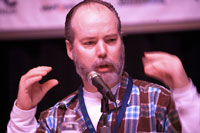Something I have learned but am having difficulty accepting - people are willing to accept less freedom and liberty in the name of security. We also seem to be willing to accept less democracy in our government as long as our unsustainable lifestyle can be supported for just a while longer. We have forgotten that despite the ease in which we can give up these rights it is far more difficult to win them back. Not to mention that we currently have people dying in Afghanistan fighting for the very rights and freedoms we are giving up.
I have set a lot of personal goals for myself that are focused on accepting responsibility for the state of the world and the quality of not only my life, but the lives of those with whom I come in contact. I have always had a disdain for politics but I have come to recognize the importance of educating myself about what each political party actually stands for (not always what they imply they stand for) when it comes to actively making a difference. My vote does count and where I cast that vote carries huge responsibility.
I doubt if one political party is less self serving and corrupt than another. However, the statement I make with my vote does affect the direction my government will chose to take my country. Lack of involvement in the political process has a huge affect on government policy. In fact, a government can come to rely upon public apathy to allow them to further their own agendas over the needs of the country.
“The best argument against democracy is a five minute conversation with the average voter.” - Winston Churchill (1874 - 1965)


